人教版(2019)必修第一册Unit 4 Natural disasters重点词汇讲解课件(21张PPT)
文档属性
| 名称 | 人教版(2019)必修第一册Unit 4 Natural disasters重点词汇讲解课件(21张PPT) | 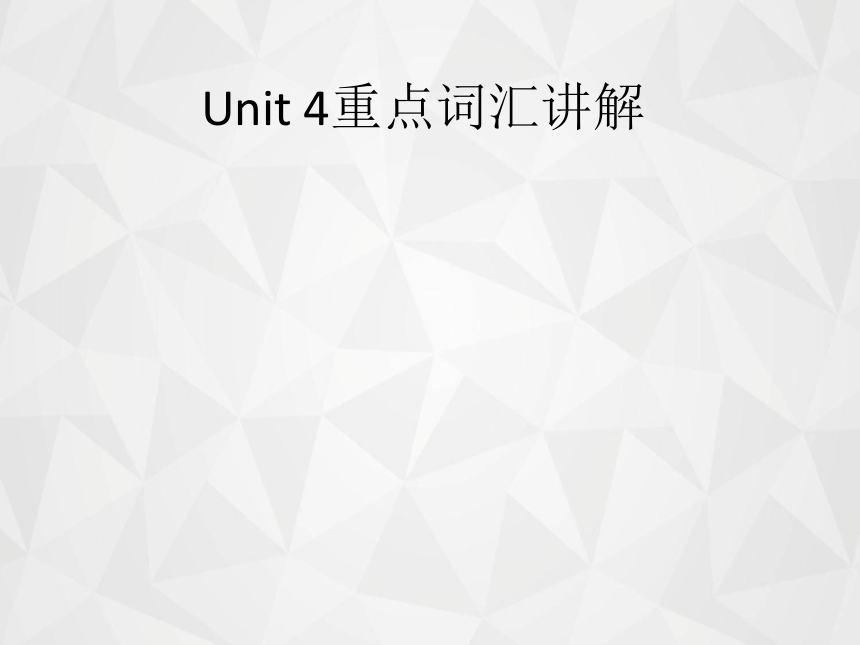 | |
| 格式 | zip | ||
| 文件大小 | 98.8KB | ||
| 资源类型 | 教案 | ||
| 版本资源 | 人教版(2019) | ||
| 科目 | 英语 | ||
| 更新时间 | 2021-12-25 20:18:40 | ||
图片预览

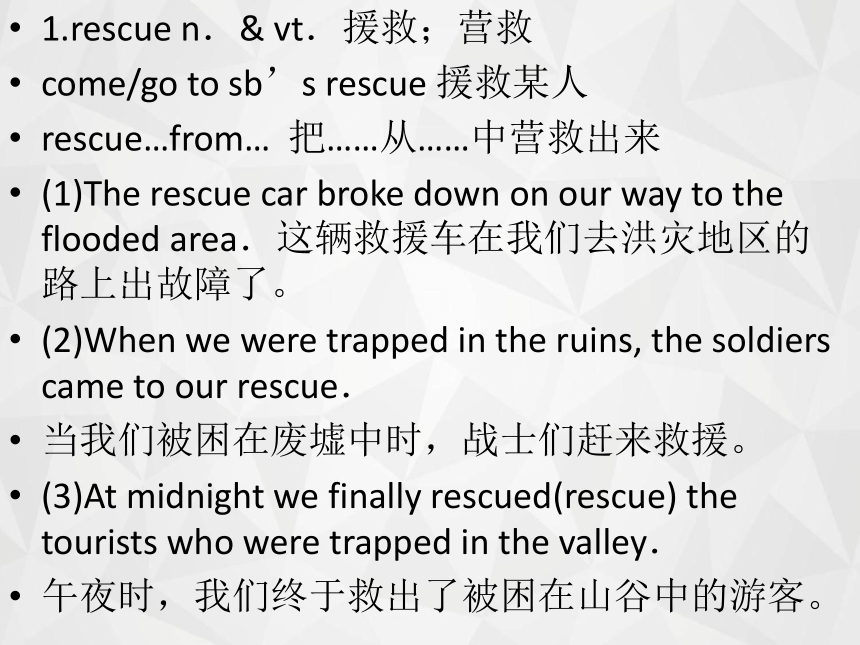
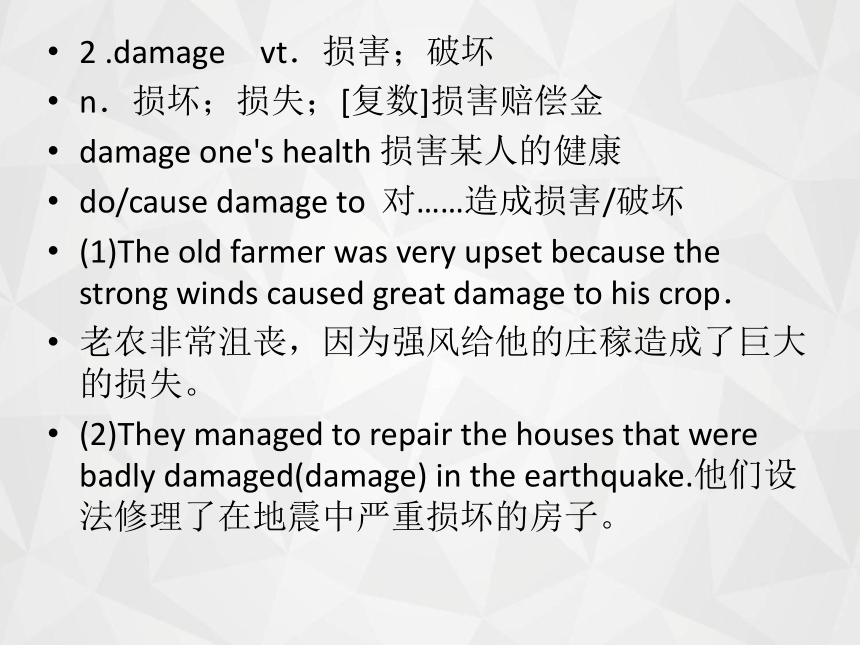
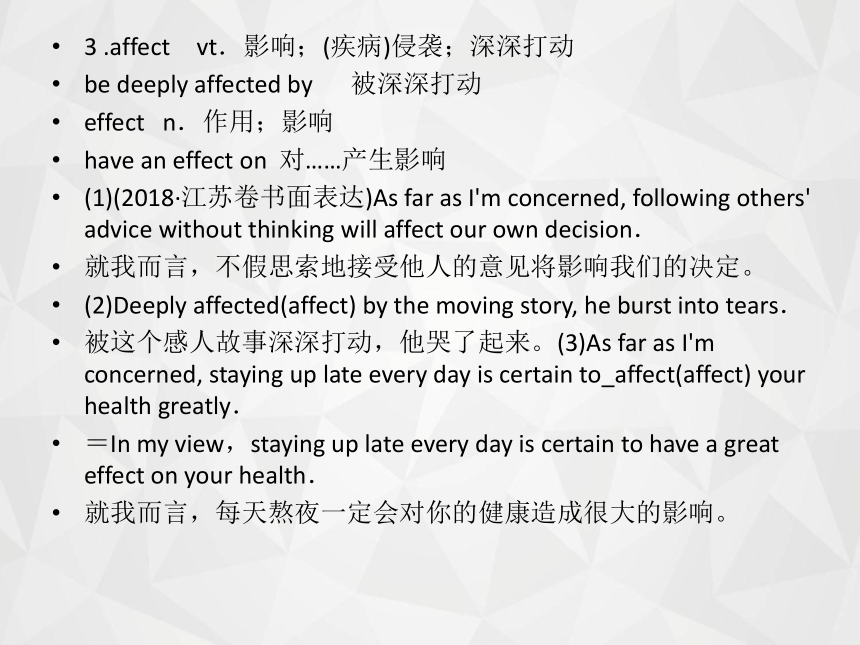
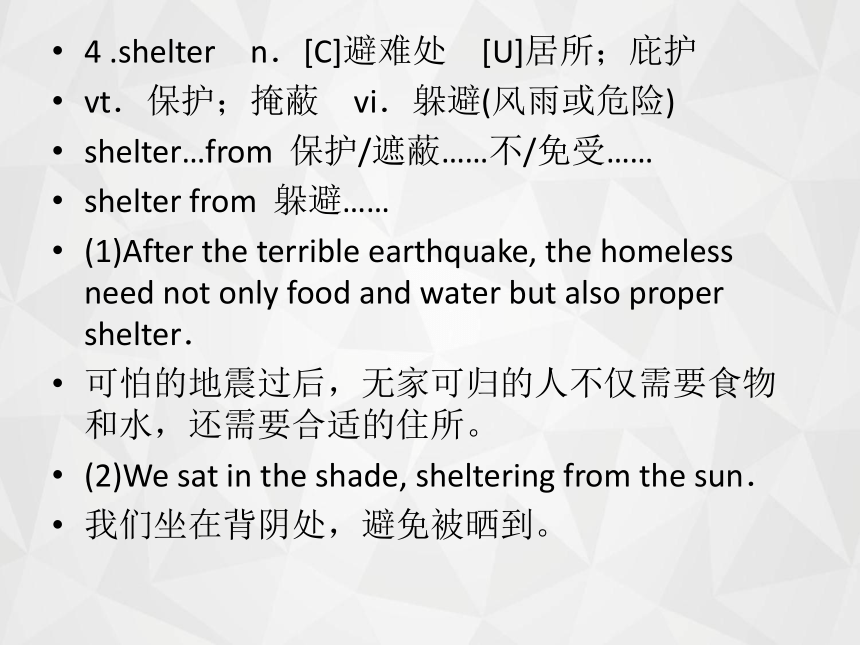
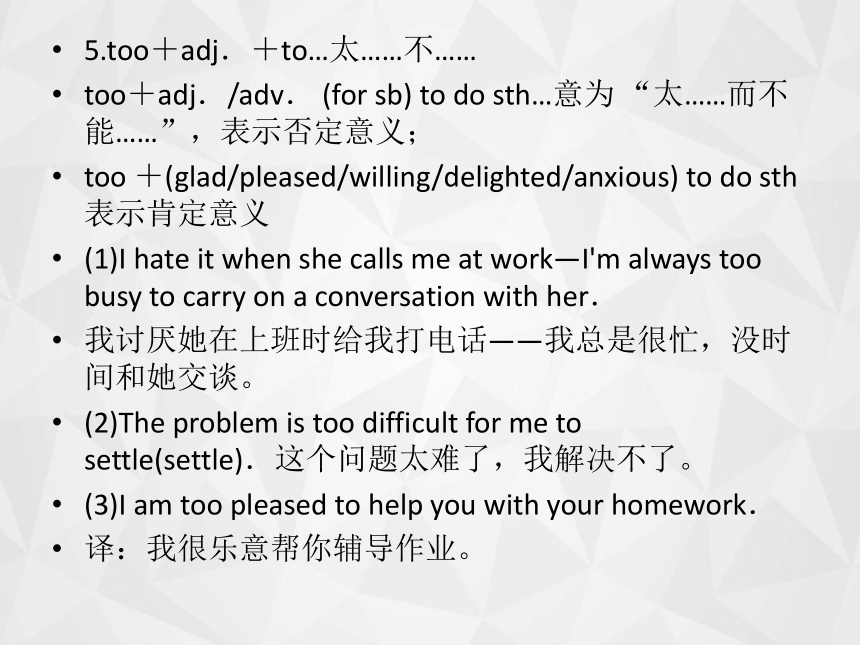
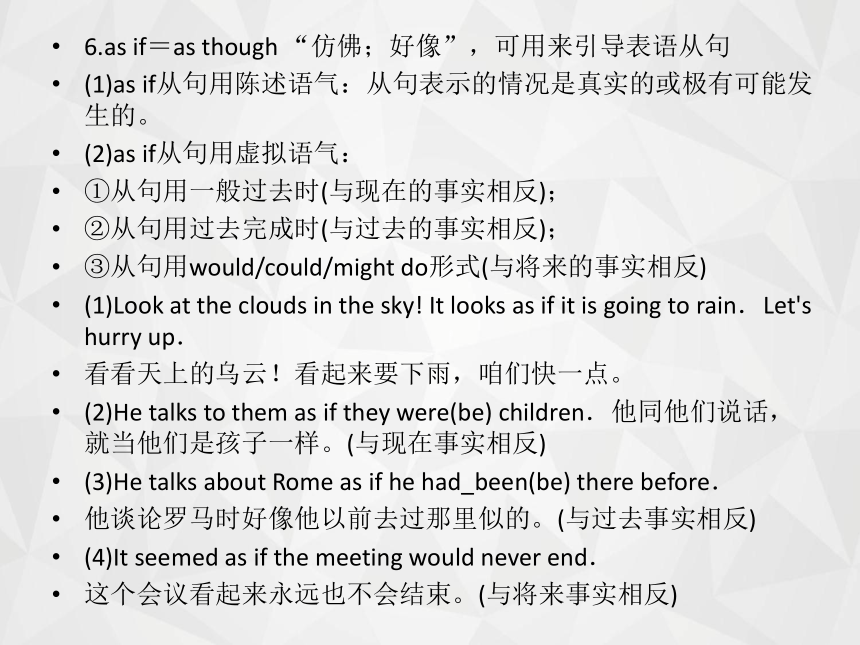
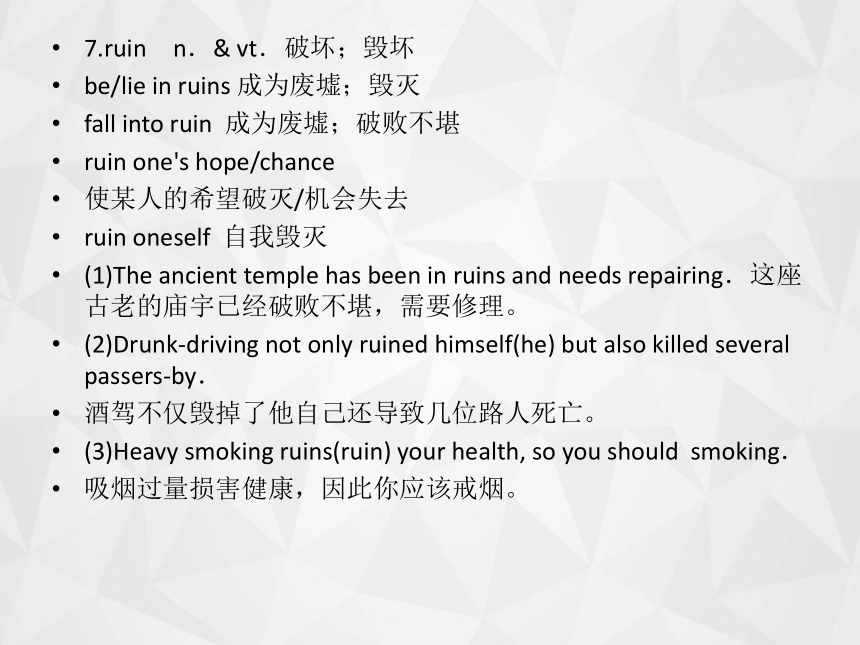
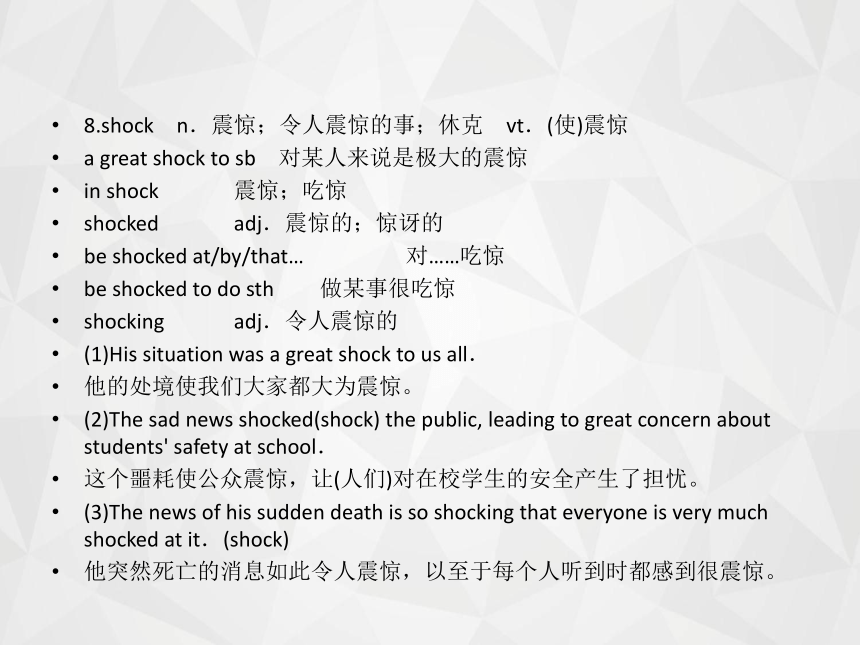
文档简介
(共21张PPT)
Unit 4重点词汇讲解
1.rescue n.& vt.援救;营救
come/go to sb’s rescue 援救某人
rescue…from… 把……从……中营救出来
(1)The rescue car broke down on our way to the flooded area.这辆救援车在我们去洪灾地区的路上出故障了。
(2)When we were trapped in the ruins, the soldiers came to our rescue.
当我们被困在废墟中时,战士们赶来救援。
(3)At midnight we finally rescued(rescue) the tourists who were trapped in the valley.
午夜时,我们终于救出了被困在山谷中的游客。
2 .damage vt.损害;破坏
n.损坏;损失;[复数]损害赔偿金
damage one's health 损害某人的健康
do/cause damage to 对……造成损害/破坏
(1)The old farmer was very upset because the strong winds caused great damage to his crop.
老农非常沮丧,因为强风给他的庄稼造成了巨大的损失。
(2)They managed to repair the houses that were badly damaged(damage) in the earthquake.他们设法修理了在地震中严重损坏的房子。
3 .affect vt.影响;(疾病)侵袭;深深打动
be deeply affected by 被深深打动
effect n.作用;影响
have an effect on 对……产生影响
(1)(2018·江苏卷书面表达)As far as I'm concerned, following others' advice without thinking will affect our own decision.
就我而言,不假思索地接受他人的意见将影响我们的决定。
(2)Deeply affected(affect) by the moving story, he burst into tears.
被这个感人故事深深打动,他哭了起来。(3)As far as I'm concerned, staying up late every day is certain to_affect(affect) your health greatly.
=In my view,staying up late every day is certain to have a great effect on your health.
就我而言,每天熬夜一定会对你的健康造成很大的影响。
4 .shelter n.[C]避难处 [U]居所;庇护
vt.保护;掩蔽 vi.躲避(风雨或危险)
shelter…from 保护/遮蔽……不/免受……
shelter from 躲避……
(1)After the terrible earthquake, the homeless need not only food and water but also proper shelter.
可怕的地震过后,无家可归的人不仅需要食物和水,还需要合适的住所。
(2)We sat in the shade, sheltering from the sun.
我们坐在背阴处,避免被晒到。
5.too+adj.+to…太……不……
too+adj./adv. (for sb) to do sth…意为 “太……而不能……”,表示否定意义;
too +(glad/pleased/willing/delighted/anxious) to do sth表示肯定意义
(1)I hate it when she calls me at work—I'm always too busy to carry on a conversation with her.
我讨厌她在上班时给我打电话——我总是很忙,没时间和她交谈。
(2)The problem is too difficult for me to settle(settle).这个问题太难了,我解决不了。
(3)I am too pleased to help you with your homework.
译:我很乐意帮你辅导作业。
6.as if=as though “仿佛;好像”,可用来引导表语从句
(1)as if从句用陈述语气:从句表示的情况是真实的或极有可能发生的。
(2)as if从句用虚拟语气:
①从句用一般过去时(与现在的事实相反);
②从句用过去完成时(与过去的事实相反);
③从句用would/could/might do形式(与将来的事实相反)
(1)Look at the clouds in the sky! It looks as if it is going to rain.Let's hurry up.
看看天上的乌云!看起来要下雨,咱们快一点。
(2)He talks to them as if they were(be) children.他同他们说话,就当他们是孩子一样。(与现在事实相反)
(3)He talks about Rome as if he had_been(be) there before.
他谈论罗马时好像他以前去过那里似的。(与过去事实相反)
(4)It seemed as if the meeting would never end.
这个会议看起来永远也不会结束。(与将来事实相反)
7.ruin n.& vt.破坏;毁坏
be/lie in ruins 成为废墟;毁灭
fall into ruin 成为废墟;破败不堪
ruin one's hope/chance
使某人的希望破灭/机会失去
ruin oneself 自我毁灭
(1)The ancient temple has been in ruins and needs repairing.这座古老的庙宇已经破败不堪,需要修理。
(2)Drunk driving not only ruined himself(he) but also killed several passers by.
酒驾不仅毁掉了他自己还导致几位路人死亡。
(3)Heavy smoking ruins(ruin) your health, so you should smoking.
吸烟过量损害健康,因此你应该戒烟。
8.shock n.震惊;令人震惊的事;休克 vt.(使)震惊
a great shock to sb 对某人来说是极大的震惊
in shock 震惊;吃惊
shocked adj.震惊的;惊讶的
be shocked at/by/that… 对……吃惊
be shocked to do sth 做某事很吃惊
shocking adj.令人震惊的
(1)His situation was a great shock to us all.
他的处境使我们大家都大为震惊。
(2)The sad news shocked(shock) the public, leading to great concern about students' safety at school.
这个噩耗使公众震惊,让(人们)对在校学生的安全产生了担忧。
(3)The news of his sudden death is so shocking that everyone is very much shocked at it.(shock)
他突然死亡的消息如此令人震惊,以至于每个人听到时都感到很震惊。
9.trap vt.使落入险境;使陷入圈套 n.险境;陷阱
be/get trapped (in/on/under)
被困于……;陷于……
trap sb into (doing) sth 诱使某人(做)某事
fall into a trap 掉进陷阱;落入圈套
(1)If you choose this way, you're likely to fall into a trap.如果你选择这条路,你很有可能会落入圈套。
(2)There was a power , they were_trapped(trap) in the lift.停电了,他们被困在电梯里。
(3)By clever questioning they trapped him into telling the truth.他们用巧妙的提问诱使他说了实话。
10.bury vt埋葬;安葬;掩埋;使沉浸;使专心
bury…in… 把……埋到……里
bury one's face/head in one's hands
双手掩面/抱头
埋头于;专心于;沉浸于
(1)She buried her face in her hands and wept when she heard the bad news.当听到那个坏消息时,她掩面而泣。
(2)In the past three weeks, we have been burying ourselves(we) in study because the exam is drawing near.因为考试即将到来,在过去的三周里我们一直专心于学习。
(3)Buried(bury) in his study, he didn't know that all the others had left.
=Burying(bury) himself in his study, he didn't know that all the others had left.
=Because he was_buried(bury) in his study, he didn't know that all the others had left.
他埋头学习,不知道其他人都早已离开了。
11.effort n.努力;艰难的尝试;尽力
spare no effort to do sth不遗余力做某事
make efforts/an/every effort to do sth
(尽一切)努力做某事
(1)I do believe that all your efforts will pay off sooner or later.我的确相信你的努力迟早会有所回报。
(2)As far as I'm concerned, you should make a greater effort to_study(study) hard.
依我看来,你应该更加努力学习。
(3)If I am lucky enough to be given such a good chance, I will spare no effort to_finish_(finish) the task.
如果我足够幸运被给予这样一个好机会,我将不遗余力地完成这项任务。
12.suffer vt.遭受;蒙受 vi.(因疾病、痛苦、悲伤等)受苦
suffer losses/pains/a heart attack
遭受损失/痛苦/心脏病发作
suffer from 患……病;因……而受苦
suffer from cold and hunger
忍饥挨冻
suffering n.苦难,痛苦
sufferer n.受难者
(1)Even if he suffered from a lot of difficulties, he never gave in.尽管遭受着许多困难,但他从不屈服。
(2)The suffered a great loss as a result of the accident.由于那次事故,该公司遭受了重大损失。
(3)She received many letters of support from some cancer sufferers(suffer).她收到许多癌症患者的支持信。
我写信是想申请学生志愿者的职位。
I'm writing to apply for the position as a student volunteer.
把理论应用于实践对我们来说是很重要的。
It is very important for us to apply theory to practice.
汤姆用干净的布擦净了伤口,然后把药敷在上面。
Tom cleaned the wound with a clean cloth and then applied some medicine to it.
杰克已申请加入中国国籍。
Jack has applied to join(join) the Chinese nationality.
在接下来的几个月里,格林先生一门心思改进技术。
Over the next months, Mr Green applied himself to improving(improve) the technique.
13.supply n.供应(量);补给;[pl.]补给品
vt.供应;供给
in short supply 短缺
have a good supply of 备有许多……
school/medical supplies 学校用品/医疗用 向……提供某物
(1)I don't know whether they have a good supply of food in the area.我不知道这个地区的食物供应是否充足。
(2)I'd like to buy a large backpack in advance to carry my supplies(supply) of food and water.
我想先买一个大的背包来装食品和水等必需品。
(3)I'd like to know the reason why the milk is in short supply in this area now.
我想知道该地区现在牛奶供应不足的原因。
(4)The government has supplied plenty of food and clothes to the local people since the earthquake occurred.政府在地震发生后已经向当地人民提供了大量的食物和衣服。
14.survive vi.生存;存活 vt.幸存;艰难度过
A survive B (by…)A比B活得长……
survive on 依靠……生活
survive from 从……流传下来
survivor n.幸存者
survival n.[U]幸存;[C]残存物
(1)(2021·1月浙江卷)Needless to say, I a lot. But I know whatever I have to face in my life I was there and I survived.毋庸置疑,我吃了很多苦。但无论在生活中要面对什么,我都挺过来了。
(2)Of the six people in the terrible accident, only two survived(survive).
在这场可怕的事故中受伤的6人中,只有2人幸存。
(3)The traveler in the lonely island survived on the fish caught in the sea.
被困在荒岛上的旅行者靠海中捕获的鱼活了下来。
(4)The old lady has survived all her sisters and brothers by ten years.
那位老太太比她所有的兄弟姐妹都多活了十年。
15.crash vi.& vt.碰撞;撞击
n.(汽车的)撞车事故;(飞机的)失事;撞击声;碰撞
crash into/onto 撞到……里/上
with a crash 轰隆一声
(1)A lot of passengers were killed in the train crash.
许多旅客在火车相撞事故中丧生了。
(2)The car crashed onto a bus on the bridge, and the driver was killed on the spot.
汽车在桥上与一辆公汽相撞,司机当场死亡。
16.wave n.海浪;波浪;挥手
v.挥手;招手;波动;起伏
a wave of 一阵/一股……
radio waves 无线电波
give sb a wave 向某人挥手
wave one's hand 挥手
wave to/at sb 向某人招手/挥手
向某人挥手告别
(1)He gave us a wave as the bus drove off.
=He waved to/at us as the bus drove off.
公共汽车开走时,他向我们挥了挥手。
(2)I waved goodbye to him, but he ignored me.
我向他挥手告别,但他不理我。
17.strike vi.& vt.(struck;struck/stricken)侵袭;突击;击打;打;撞(击);罢工;突然想到;打动,迷住;敲(钟)
n.罢工;罢课;袭击
be struck by 被……打动
某人突然想起……
be/go on strike 举行罢工
[一词多义]——写出下列句中strike的含义
(1)The clock struck twelve when I got home last night. 敲(钟)
(2)A terrible earthquake did strike the northeast of Japan on March 11. 侵袭
(3)A good idea struck me when I was reading the newspaper. 突然想到
(4)The visitors were struck by the beauty of the West Lake. 打动,迷住
(5)(全国卷Ⅲ完形填空改编)Just before September, Miller was struck by a car and lost his right arm. 碰;撞
(6)It_suddenly_struck_me_that I should pay a visit to my teacher.
=It suddenly hit me that I should pay a visit to my teacher.
我突然想到,我应该拜访我的老师。
18.deliver vt.& vi.递送;传达 vt.发表(演说等);接生
deliver sth (to sb) 递送/传送某物(给某人)
deliver a speech 发表演讲/致辞
be delivered of a baby/give birth to a baby
生孩子
deliver a baby 接生
(1)The nurse delivered the twins safely last night.
昨天晚上那位护士安全地接生了一对孪生儿。
(2)It was very considerate of you to deliver milk to our door every morning.
你考虑得非常周到,每天早上把牛奶送到我们家门口。
19.句型:be doing sth when…正在做某事,这时……
when在此处是并列连词,表示“正在那时,这时”,常用句型还有:
Sb be about to do…when… 正要做……,就在这时……
Sb had just done…when… 刚做过……,这时……
(1)We were having a meeting when someone broke in.
当时我们正在开会,突然有人闯了进来。
(2)I had just come out of the kitchen when someone knocked at the door.
我刚从厨房出来,就有人敲门。
(3)We were about to set off when it suddenly began to rain. 我们正要出发,这时突然下起雨来。
Unit 4重点词汇讲解
1.rescue n.& vt.援救;营救
come/go to sb’s rescue 援救某人
rescue…from… 把……从……中营救出来
(1)The rescue car broke down on our way to the flooded area.这辆救援车在我们去洪灾地区的路上出故障了。
(2)When we were trapped in the ruins, the soldiers came to our rescue.
当我们被困在废墟中时,战士们赶来救援。
(3)At midnight we finally rescued(rescue) the tourists who were trapped in the valley.
午夜时,我们终于救出了被困在山谷中的游客。
2 .damage vt.损害;破坏
n.损坏;损失;[复数]损害赔偿金
damage one's health 损害某人的健康
do/cause damage to 对……造成损害/破坏
(1)The old farmer was very upset because the strong winds caused great damage to his crop.
老农非常沮丧,因为强风给他的庄稼造成了巨大的损失。
(2)They managed to repair the houses that were badly damaged(damage) in the earthquake.他们设法修理了在地震中严重损坏的房子。
3 .affect vt.影响;(疾病)侵袭;深深打动
be deeply affected by 被深深打动
effect n.作用;影响
have an effect on 对……产生影响
(1)(2018·江苏卷书面表达)As far as I'm concerned, following others' advice without thinking will affect our own decision.
就我而言,不假思索地接受他人的意见将影响我们的决定。
(2)Deeply affected(affect) by the moving story, he burst into tears.
被这个感人故事深深打动,他哭了起来。(3)As far as I'm concerned, staying up late every day is certain to_affect(affect) your health greatly.
=In my view,staying up late every day is certain to have a great effect on your health.
就我而言,每天熬夜一定会对你的健康造成很大的影响。
4 .shelter n.[C]避难处 [U]居所;庇护
vt.保护;掩蔽 vi.躲避(风雨或危险)
shelter…from 保护/遮蔽……不/免受……
shelter from 躲避……
(1)After the terrible earthquake, the homeless need not only food and water but also proper shelter.
可怕的地震过后,无家可归的人不仅需要食物和水,还需要合适的住所。
(2)We sat in the shade, sheltering from the sun.
我们坐在背阴处,避免被晒到。
5.too+adj.+to…太……不……
too+adj./adv. (for sb) to do sth…意为 “太……而不能……”,表示否定意义;
too +(glad/pleased/willing/delighted/anxious) to do sth表示肯定意义
(1)I hate it when she calls me at work—I'm always too busy to carry on a conversation with her.
我讨厌她在上班时给我打电话——我总是很忙,没时间和她交谈。
(2)The problem is too difficult for me to settle(settle).这个问题太难了,我解决不了。
(3)I am too pleased to help you with your homework.
译:我很乐意帮你辅导作业。
6.as if=as though “仿佛;好像”,可用来引导表语从句
(1)as if从句用陈述语气:从句表示的情况是真实的或极有可能发生的。
(2)as if从句用虚拟语气:
①从句用一般过去时(与现在的事实相反);
②从句用过去完成时(与过去的事实相反);
③从句用would/could/might do形式(与将来的事实相反)
(1)Look at the clouds in the sky! It looks as if it is going to rain.Let's hurry up.
看看天上的乌云!看起来要下雨,咱们快一点。
(2)He talks to them as if they were(be) children.他同他们说话,就当他们是孩子一样。(与现在事实相反)
(3)He talks about Rome as if he had_been(be) there before.
他谈论罗马时好像他以前去过那里似的。(与过去事实相反)
(4)It seemed as if the meeting would never end.
这个会议看起来永远也不会结束。(与将来事实相反)
7.ruin n.& vt.破坏;毁坏
be/lie in ruins 成为废墟;毁灭
fall into ruin 成为废墟;破败不堪
ruin one's hope/chance
使某人的希望破灭/机会失去
ruin oneself 自我毁灭
(1)The ancient temple has been in ruins and needs repairing.这座古老的庙宇已经破败不堪,需要修理。
(2)Drunk driving not only ruined himself(he) but also killed several passers by.
酒驾不仅毁掉了他自己还导致几位路人死亡。
(3)Heavy smoking ruins(ruin) your health, so you should smoking.
吸烟过量损害健康,因此你应该戒烟。
8.shock n.震惊;令人震惊的事;休克 vt.(使)震惊
a great shock to sb 对某人来说是极大的震惊
in shock 震惊;吃惊
shocked adj.震惊的;惊讶的
be shocked at/by/that… 对……吃惊
be shocked to do sth 做某事很吃惊
shocking adj.令人震惊的
(1)His situation was a great shock to us all.
他的处境使我们大家都大为震惊。
(2)The sad news shocked(shock) the public, leading to great concern about students' safety at school.
这个噩耗使公众震惊,让(人们)对在校学生的安全产生了担忧。
(3)The news of his sudden death is so shocking that everyone is very much shocked at it.(shock)
他突然死亡的消息如此令人震惊,以至于每个人听到时都感到很震惊。
9.trap vt.使落入险境;使陷入圈套 n.险境;陷阱
be/get trapped (in/on/under)
被困于……;陷于……
trap sb into (doing) sth 诱使某人(做)某事
fall into a trap 掉进陷阱;落入圈套
(1)If you choose this way, you're likely to fall into a trap.如果你选择这条路,你很有可能会落入圈套。
(2)There was a power , they were_trapped(trap) in the lift.停电了,他们被困在电梯里。
(3)By clever questioning they trapped him into telling the truth.他们用巧妙的提问诱使他说了实话。
10.bury vt埋葬;安葬;掩埋;使沉浸;使专心
bury…in… 把……埋到……里
bury one's face/head in one's hands
双手掩面/抱头
埋头于;专心于;沉浸于
(1)She buried her face in her hands and wept when she heard the bad news.当听到那个坏消息时,她掩面而泣。
(2)In the past three weeks, we have been burying ourselves(we) in study because the exam is drawing near.因为考试即将到来,在过去的三周里我们一直专心于学习。
(3)Buried(bury) in his study, he didn't know that all the others had left.
=Burying(bury) himself in his study, he didn't know that all the others had left.
=Because he was_buried(bury) in his study, he didn't know that all the others had left.
他埋头学习,不知道其他人都早已离开了。
11.effort n.努力;艰难的尝试;尽力
spare no effort to do sth不遗余力做某事
make efforts/an/every effort to do sth
(尽一切)努力做某事
(1)I do believe that all your efforts will pay off sooner or later.我的确相信你的努力迟早会有所回报。
(2)As far as I'm concerned, you should make a greater effort to_study(study) hard.
依我看来,你应该更加努力学习。
(3)If I am lucky enough to be given such a good chance, I will spare no effort to_finish_(finish) the task.
如果我足够幸运被给予这样一个好机会,我将不遗余力地完成这项任务。
12.suffer vt.遭受;蒙受 vi.(因疾病、痛苦、悲伤等)受苦
suffer losses/pains/a heart attack
遭受损失/痛苦/心脏病发作
suffer from 患……病;因……而受苦
suffer from cold and hunger
忍饥挨冻
suffering n.苦难,痛苦
sufferer n.受难者
(1)Even if he suffered from a lot of difficulties, he never gave in.尽管遭受着许多困难,但他从不屈服。
(2)The suffered a great loss as a result of the accident.由于那次事故,该公司遭受了重大损失。
(3)She received many letters of support from some cancer sufferers(suffer).她收到许多癌症患者的支持信。
我写信是想申请学生志愿者的职位。
I'm writing to apply for the position as a student volunteer.
把理论应用于实践对我们来说是很重要的。
It is very important for us to apply theory to practice.
汤姆用干净的布擦净了伤口,然后把药敷在上面。
Tom cleaned the wound with a clean cloth and then applied some medicine to it.
杰克已申请加入中国国籍。
Jack has applied to join(join) the Chinese nationality.
在接下来的几个月里,格林先生一门心思改进技术。
Over the next months, Mr Green applied himself to improving(improve) the technique.
13.supply n.供应(量);补给;[pl.]补给品
vt.供应;供给
in short supply 短缺
have a good supply of 备有许多……
school/medical supplies 学校用品/医疗用 向……提供某物
(1)I don't know whether they have a good supply of food in the area.我不知道这个地区的食物供应是否充足。
(2)I'd like to buy a large backpack in advance to carry my supplies(supply) of food and water.
我想先买一个大的背包来装食品和水等必需品。
(3)I'd like to know the reason why the milk is in short supply in this area now.
我想知道该地区现在牛奶供应不足的原因。
(4)The government has supplied plenty of food and clothes to the local people since the earthquake occurred.政府在地震发生后已经向当地人民提供了大量的食物和衣服。
14.survive vi.生存;存活 vt.幸存;艰难度过
A survive B (by…)A比B活得长……
survive on 依靠……生活
survive from 从……流传下来
survivor n.幸存者
survival n.[U]幸存;[C]残存物
(1)(2021·1月浙江卷)Needless to say, I a lot. But I know whatever I have to face in my life I was there and I survived.毋庸置疑,我吃了很多苦。但无论在生活中要面对什么,我都挺过来了。
(2)Of the six people in the terrible accident, only two survived(survive).
在这场可怕的事故中受伤的6人中,只有2人幸存。
(3)The traveler in the lonely island survived on the fish caught in the sea.
被困在荒岛上的旅行者靠海中捕获的鱼活了下来。
(4)The old lady has survived all her sisters and brothers by ten years.
那位老太太比她所有的兄弟姐妹都多活了十年。
15.crash vi.& vt.碰撞;撞击
n.(汽车的)撞车事故;(飞机的)失事;撞击声;碰撞
crash into/onto 撞到……里/上
with a crash 轰隆一声
(1)A lot of passengers were killed in the train crash.
许多旅客在火车相撞事故中丧生了。
(2)The car crashed onto a bus on the bridge, and the driver was killed on the spot.
汽车在桥上与一辆公汽相撞,司机当场死亡。
16.wave n.海浪;波浪;挥手
v.挥手;招手;波动;起伏
a wave of 一阵/一股……
radio waves 无线电波
give sb a wave 向某人挥手
wave one's hand 挥手
wave to/at sb 向某人招手/挥手
向某人挥手告别
(1)He gave us a wave as the bus drove off.
=He waved to/at us as the bus drove off.
公共汽车开走时,他向我们挥了挥手。
(2)I waved goodbye to him, but he ignored me.
我向他挥手告别,但他不理我。
17.strike vi.& vt.(struck;struck/stricken)侵袭;突击;击打;打;撞(击);罢工;突然想到;打动,迷住;敲(钟)
n.罢工;罢课;袭击
be struck by 被……打动
某人突然想起……
be/go on strike 举行罢工
[一词多义]——写出下列句中strike的含义
(1)The clock struck twelve when I got home last night. 敲(钟)
(2)A terrible earthquake did strike the northeast of Japan on March 11. 侵袭
(3)A good idea struck me when I was reading the newspaper. 突然想到
(4)The visitors were struck by the beauty of the West Lake. 打动,迷住
(5)(全国卷Ⅲ完形填空改编)Just before September, Miller was struck by a car and lost his right arm. 碰;撞
(6)It_suddenly_struck_me_that I should pay a visit to my teacher.
=It suddenly hit me that I should pay a visit to my teacher.
我突然想到,我应该拜访我的老师。
18.deliver vt.& vi.递送;传达 vt.发表(演说等);接生
deliver sth (to sb) 递送/传送某物(给某人)
deliver a speech 发表演讲/致辞
be delivered of a baby/give birth to a baby
生孩子
deliver a baby 接生
(1)The nurse delivered the twins safely last night.
昨天晚上那位护士安全地接生了一对孪生儿。
(2)It was very considerate of you to deliver milk to our door every morning.
你考虑得非常周到,每天早上把牛奶送到我们家门口。
19.句型:be doing sth when…正在做某事,这时……
when在此处是并列连词,表示“正在那时,这时”,常用句型还有:
Sb be about to do…when… 正要做……,就在这时……
Sb had just done…when… 刚做过……,这时……
(1)We were having a meeting when someone broke in.
当时我们正在开会,突然有人闯了进来。
(2)I had just come out of the kitchen when someone knocked at the door.
我刚从厨房出来,就有人敲门。
(3)We were about to set off when it suddenly began to rain. 我们正要出发,这时突然下起雨来。
